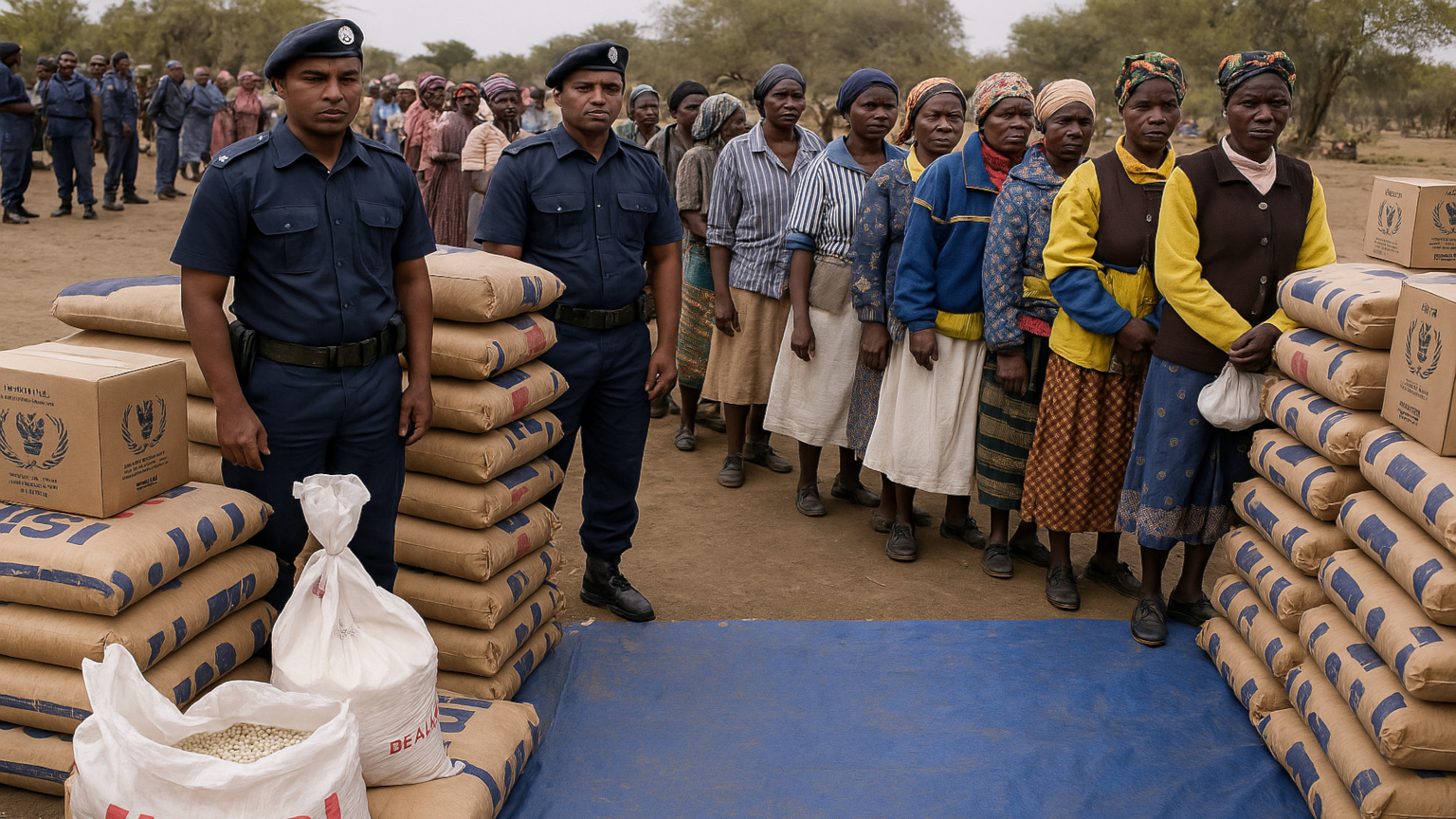7. Lack of Regional Infrastructure and Access:
Some of the most impoverished regions on the planet are also some of the most remote. The difficulty in accessing the communities of starving people is multiplied by the lack of infrastructure available to these areas.
Sometimes, something as simple as a bridge over a small river is all it would take to provide a half-day’s short cut to a part of the region that is desperate for food and supplies. But, bridges cost money and the local government is all tapped out for at least several more years.
The lack of infrastructure might be a lack of a good water source, electricity, or good roads to connect the various regions of an area desperate for commerce.
It’s a sobering thing to see how big of a hinderance a lack of infrastructure can be for an area’s economic well-being, one that many developed nations take for granted.
You see, I can have all of the food and resources in the world, but if I can’t transport them to where they are needed then it doesn’t do any good. That is why infrastructure is one of the main requirements to adequately solve world hunger.
6. Oversimplified and Ineffective Solutions and Programs:
Establishing and managing projects that tackle world hunger effectively is all in a day’s work, right?
Well, maybe it is all just a bit harder than all of that. The typical American mentality is “if I throw enough money at the problem, it will be solved and we can move on to the next thing”… only it takes a lot more than just money. It takes massive planning, people and resources, determination, and ongoing execution for an initiative to take root and start to see some success.
The problem is that most initiatives don’t have those things, and the ones that do are amateur at best. Sure, a multi-billion dollar business will get a team of engineers and a certified project manager on their side, but charities can seldom afford those things and often end up with piece-meal and half-baked efforts that fizzle out quickly.
Overcoming the challenges in planning out a hunger solution that works well will take into account human psychology, economics, logistics, political road blocks, cultural and systemic inequalities, corruption, and end-community adoption.
Even then, you might not have what it takes. There is no certainty in solving this.
5. Under-involvement of the Relief Organizations:
As in every business, you get out what you put in. If you put in cheap, low-quality efforts, then you will get that back out of it. The effort and resources it takes to bring a project to life and cause it to thrive is more than a bootstrapping endeavor, but the street-level charity often has a shoestring budget and a skeleton crew, and so this can be an issue.
There are many resource and logistical challenges with a world charity, the biggest of which is not having boots on the ground. It is almost impossible to establish a starvation eradicating program without the oversight of an on-site resource, and yet some charities endeavor to have only part-time resources come in and run the show. This under involvement will show in the long run.
The question gets raised, “Why not recruit the locals to run the operations?” Well the answer to that question is complex but I think I can summarize it with one word: accountability. Hiring locals can definitely have its advantages, but it must be in combination with the oversight of the organization’s presence. As any non-profit who has spent any amount of time internationally will tell you, if you do not have 100% transparent accountability, then you can go ahead and assume there is corruption.
Absolute power corrupts absolutely.
And giving no transparency is a form of absolute power.
This goes deeper than merely questioning the motives of the givers vs. the gives. The people or races in under-developed countries are not being labeled as “more prone to corruption” than the rest of us. What I am saying is that all of us are susceptible to this. It’s just human nature.
We all easily corrupt if given the chance to get away with it. People don’t act according to what is expected, they act according to what is inspected. This applies to all of us, regardless of where you are from.
In a first-world, developed nation, you wouldn’t try to run a corporation without well-screened, background-checked employees, good audited bookkeeping, double-signatures for withdrawals on bank accounts, and a highly scrutinizing board of trustees for proper oversight and accountability. Cutting these corners inevitably results in the high likelihood of fraud, embezzlement, and all kinds of corruption.
So why would an international charitable operation be any different if they don’t receive the same level of oversight? It is not optional. You cannot cut the corners that charity operations so often cut.
For more stories on why a lack of accountability is a bad idea, see reason #4.
4. Corruption and “skimming” of Local Workers, Scammers:
If I have seen it once, I have seen it dozens of times. Charities don’t realize that attracting NGO money flowing from western nations is literally a predominant job category of its own within many undeveloped nations.
It goes something like this: Some guy in an impoverished nation who has a Facebook account goes out to the slums in his city and puts a plate of food into the hands of some random street kids. He then posts pictures of himself “feeding” the kids at his “orphanage” on his facebook and sends warm greetings out to random westerners to appeal to their sympathies. That scammer succeeds in getting a gullible westerner to wire $100 of “support”, of which $95 goes into his pocket and he saves the other $3 to buy a little more rice and beans for his dozen “orphans” that he visits a month later so he can take more selfies with them and send updates to his donors, making it look like this is what he has been doing all month long with the $100 you gave him. He wants to make you into a regular donor so that he can afford his car or house payment, living it up.
Some of the unscrupulous ones might even reclaim the fake/staged plates of food after the selfies are snapped, telling the street kids to get lost.
I’m not joking, I’ve seen it all.
Even if you visit them in person, the charade is easy to maintain. It is simple enough for the scammer to gather a crowd of street children and have them pretend to be his “orphanage”. None of them speak English like he does so they can’t tell you the truth, and he will threaten them to behave in front of you just in case. Parents might even donate their kids for the afternoon to the scammer with hopes that their child might get some handouts from the visiting westerner. It is amazing what poverty reduces us to do.
By the way, nobody is being blamed. This rant is not to expose how terrible people in developing countries are. For one thing, they aren’t terrible. They are poor. They go through more moral dilemmas in one day than someone in a western country goes through in a year. I can’t point a finger at them.
They only reason it is brought up is because we want the funds to go where they were meant to go, - to the most vulnerable demographics, not into the pockets of able-bodied people scamming because of their greed.
Anyhow, those single-operator scams are fairly easy to spot if you know what to look for, but scams can come in sizes and appearances that are much more elaborate than even that. Some charities can be well established and highly trusted on an international level, only to have to fire one or more people within their operations because of massive embezzlement and corruption being discovered.
My oh my, the stories I could tell you for hours and hours if I had the time.
I’ve learned that, if there is no accountability and oversight, and if it is just a matter of “taking their word for it”, then you might as well assume that there is corruption and embezzling. It’s just human nature.
If you cannot provide air-tight oversight and accountability, preferably by someone within your organization living and working locally, then you are merely funding the lifestyle of the person you are giving money to, not the poor souls that they pretend to pass along the money and resources to.
3. Institutionalized Dependency of Recipients:
Even the best of intentions from the start can end in less-than-honorable outcomes. Human nature can start off well, but corrode over time.
The old saying is that the first time you give, there is genuine thankfulness. The second time you give, there is indifference. The third time you give, it was expected. The fourth time you give, there is downright entitlement.
They murmur if you are late with what they deem to be “theirs” before you even gave it to them. They get upset at you if you have to decrease what you give them because of cutbacks and budget tightening from lost donors.
Not that those things are so bad, but it is the fact that, for those who are able-bodied healthy people, humanitarian aid is meant to be temporary assistance, not a lifelong dependency.
Widows, disabled people, children, refugees, and other marginalized demographics are the exception, - they should be given assistance regularly and profusely. But for the rest of the population, giving free handouts can actually be counter-productive in lifting a society out of poverty.
For example, free handouts of food to the general population of a town will only put local famers out of business because they can’t compete with “free”. Then when the free food is gone, that town will be worse off than before because there are no farmers – you put them out of business, remember?
There has to be a drive for sustainability and economical growth, otherwise a region will never be lifted out of poverty longterm, but they will stay in a helpless and dependent state of need. As a rule, money is better spent on things like education, infrastructure, business and job creation, and other things that will allow a region to shake off its poverty in the long term.
Again, this has to be a long term strategic effort, one that many NGO’s struggle to achieve. The western mindset doesn’t want to admit it, but throwing money at impoverished nations cannot fix their problems. The money will be spent and they will be right back where they were. We also must be careful to not try to force our culture on to them, as though western culture is superior and they need us to colonize them.
They don’t.
If they want to move forward to a more developed society then they should pick and choose which advancements they want to incorporate into their own culture, not have those developments forced upon them. When bringing aid and assistance for the most helpless demographics in a region, the rest of the society should be assisted through coaching and education, if desired.
Dependency on free handouts from the west is never the ultimate long term goal.
2. The “Red Tape” of National, City, State, and Local Policies and Statutes:
So, you want to bring a cargo shipping container filled with pallets of food into your favorite starving country by means of their main port? Not so fast. There is a standard tariff that you already knew about, but after you pay it, the container just sits at the port for 10 days, waiting for approval. All attempts to contact the city official who can tell you what is going on are unanswered and ignored.
You begin to wonder, “Are they waiting for me to try and bribe them? Is that what is going on here?”
Finally, you hear back with some news. Surprise, surprise, the official tells you that now there is an additional local excise tax just added on by his back office. The tax is several times the worth of the donated food contained in the shipping container. Failure to pay the excise tax means that you forfeit your cargo shipping container as well as all of its contents right then and there. Given little choice, you scramble to raise the money and pay it.
By the time you get done paying it all, you wonder if the local officials really want anybody to come in and help at all. If they do, why are they making it so hard? Don’t they care that we are helping their people?
While many local and regional governments operate with a high level of integrity, the exceptions are far too many.
One nation imposes a “no outside NGO” policy in order to curb the influence of outside (western) cultures that have a way of infiltrating a society by means of their NGO’s and charity money.
Another nation might not be eligible for charity support due to disapproval and roadblocks from the western capitalism-based NGO’s themselves as a sort of sanction against something about the country they don’t like, and that country responds by rejecting anyone trying to come in as well.
Other regions might be inaccessible due to wars, natural disasters, or disease outbreaks.
We haven’t even mentioned what happens when the higher levels of government within a country decides that they are going to allow corruption and bribery at every level of bureaucracy. I would like to pretend that is only a thing in underdeveloped countries, but it is a thing in western countries as well, but I digress.
The bottom line is, if a government entity refuses to give you access to their region, then aid will not make it in, no matter how desperate it is needed.
1. Government Corruption:
If you thought that the red tape and ridiculous barriers set up by local authorities are bad, wait until you start to deal with the top-level national leader(s). This never ceases to amaze me. The reason why so many countries are so poor is because, far more often than not, they are ruled by a narcissistic dictator who doesn’t seem to mind how much of a mess his country is in as long as he is in control of it.
I’ve seen and heard of the most disturbing behavior from these figureheads, enough to make you wonder if world hunger will ever be solved.
For example, there is the forlorn dictator, who resents that fact that his precious economic ideology (socialism, communism, or whatever), is starving his country to death and refuses to accept foreign aid from the capitalist countries because “my people will proudly die before admitting that our ideology has failed.” He is all too eager to speak for his own citizens as he lounges in his mansion.
Then, only a few countries away, there is the top official who has agreed to accept aid from several charities and cooperates with the logistical coordination all the way up until the shipments arrive and he sees that the pallets are filled with mostly rice, beans, lentils, and a few other grains. “Send them back, we do not want America’s rejects and leftovers,” he sneers in mockery. He refuses to sign off on acceptance while he gets back into his limo and drives away. Meanwhile starvation deaths continue to drastically climb throughout his country.
The stories are seldom told due to the power that is held by these world leaders and the tendency of their critics to “disappear” if they get too loud. You will notice that I am not naming names or pointing at any particular nation, I am simply making vague statements of hearsay, take it or leave it.
Still, this reason is number one on this list of hinderances to solving world hunger because it is the single biggest hinderance by far. Lack of money and lack of programs both cannot compete with the troublesome barriers that corrupt governments and political blockades present.
What are your thoughts on this list? Write us a comment and let us know.
 People would rather hear about sports scores, dirt on a hated politician, or the latest celebrity gossip than hear about how many people died from malnutrition on the other side of the world.
People would rather hear about sports scores, dirt on a hated politician, or the latest celebrity gossip than hear about how many people died from malnutrition on the other side of the world.




SHARE THIS PAGE!